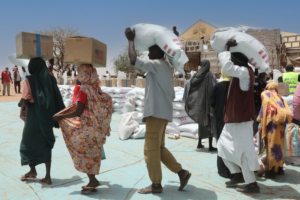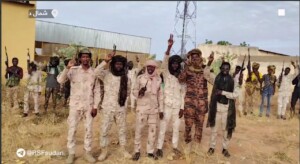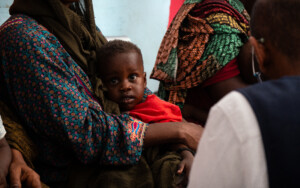UK urges UN to ensure follow-up on mass rapes in Darfur
British UN Ambassador Matthew Rycroft has demanded the UN to review follow-up mechanisms on reports of mass rapes. After his draft resolution for the extension of the UN-AU peacekeeping Mission in Darfur (Unamid) was unanimously accepted by the Security Council, he told the press on Monday that reports of mass rape, as in Tabit, North Darfur last year, “must be vigorously followed up, pursued, investigated”.
British UN Ambassador Matthew Rycroft has demanded the UN to review follow-up mechanisms on reports of mass rapes. After his draft resolution for the extension of the UN-AU peacekeeping Mission in Darfur (Unamid) was unanimously accepted by the Security Council, he told the press on Monday that reports of mass rape, as in Tabit, North Darfur last year, “must be vigorously followed up, pursued, investigated”.
Radio Dabanga reported on 2 November last year that army forces raped more than 200 women and girls in Tabit. The soldiers said that they had been ordered to do so in their search for a missing colleague.
Khartoum did not allow Unamid to investigate the case. Later, members of the peacekeeping mission could enter the village under surveillance of the National Intelligence and Security Service (NISS). Consecutive UN human rights investigators were all unable to independently verify the reports.
In a report issued on 11 February, Human Rights Watch (HRW) confirmed the mass rape, and described the situation in Tabit as being like “living in an open prison”. Since the rape, government officials, military commanders, and traditional leaders threatened residents of Tabit to prevent them from speaking out, the report stated.
Rycroft was quoted by Inner City Press: “There are very serious allegations of sexual exploitation and abuse in Darfur and elsewhere around the world. It is important wherever there are allegations, they must be vigorously followed up, pursued, investigated. There is a very important role for UN peacekeeping missions around the world to do that, and to set the highest standards of behaviour amongst their troops.
“And I think there are opportunities through the Review of Peace Operations, through the review of the Peace Building architecture, and later this year through the review of the whole Women, Peace and Security Agenda to make further progress on that issue.”
The British UN Ambassador further told reporters that: “Now is not the time to cut and run. Sudan has the greatest number of displaced people in Africa. And 2014 saw the worst level of suffering in the last ten years.”
The Security Council expressed its deep concern about the rapid deterioration of the security situation in Darfur, “in particular through a marked escalation of hostilities between government forces and armed rebel groups”.
Sudan's Deputy UN Ambassador Hassan Hamid Hassan commented that it was “completely wrong” to say that Darfur is engulfed in warfare. He said that the Sudanese government is committed to continue its cooperation with Unamid, but that peacekeeping troops could be withdrawn in several areas in Darfur that are now stable.
The UN Security Council on Monday passed Resolution 2228 on Darfur, extending the mandate of Unamid for another year, until 30 June 2016.
The resolution also continues the mandate under chapter VII of the UN Charter. With regard to the protection of civilians, it calls on Unamid to continue to move in the direction of a more preventive and pre-emptive approach, while engaging in effective and active patrolling in high risk areas, including in areas where large numbers of displaced took refuge. Concerning humanitarian access, it calls for such access to be unhindered, safe and timely, while also noting the peacekeepers mission’s role in protecting humanitarian workers.
Like last year’s resolution, the draft text paints a dire picture of the security and humanitarian situation in Darfur. It expresses deep concern over the deteriorating security situation in the region and its effect on civilians. It highlights the heightened fighting between the government and rebel forces and an escalation of inter-communal violence. Aerial bombardments, criminality, banditry, inter-communal conflict, and attacks by government forces and rebel groups are among the factors noted that undermine the security of civilians.
(Inner City Press, Reuters, UNSC Resolution 2228 transcript)











 and then
and then